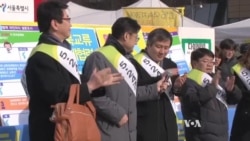Business leaders in South Korea are calling for President Park Geun-hye to ease trade restrictions with North Korea that were put in place in 2010 after the sinking of a South Korean warship.
Expanding trade and investment, they say, is good not only for business but also for long-term regional peace and security.
Seoul cut many economic ties after a North Korean submarine allegedly sank the South Korean vessel, killing 46 sailors. But Yoo Dong-ho, president of the Emergency Response Committee of Inter-Korean Economic Cooperation — which claims to represent more than 140 South Korean companies that used to trade with or operate in North Korea — says the trade curbs aren't punishing Pyongyang.
“In North Korea, management rights and monopoly status of the businesses that South Koreans have invested in over years were given to China, Russia and Europe," he said. "Only South Korean businesses have been destroyed.”
South Korea still permits businesses to operate in North Korea’s Kaesong industrial zone. The 55,000 workers in these factories make between $70 and $100 a month, much less than the minimum wage in the South. The wages, however, are paid to the North Korean government and are not distributed directly to the workers.
South Korea also suspended tours in 2008 to the Kumgang Mountain area after North Korean soldiers shot a visitor.
President Park and her conservative allies hold that Pyongyang must make amends for past aggression and for violating nuclear agreements before the trade ban is lifted. But this year, she has said, it is time for the two sides to start talking again about peaceful reunification.
"My position is that to ease the pain of division and to accomplish peaceful unification, I am willing to meet with anyone," Park said.
South Korea National Assembly Representative Hong Ik-pyo, with the opposition New Politics Alliance for Democracy, says expanding trade and business ties are essential parts of any unification process.
“For countries under conflict such as China and Taiwan, the most important things are the processes of peace, exchange and cooperation," he said. "I think it is not appropriate to move toward reunification without those things.”
But given Pyongyang’s past broken promises to end its nuclear program in exchange for aid, many in the South remain skeptical that restoring trade ties would this time succeed in bringing peace to the Korean peninsula.
VOA News producer Youmi Kim contributed to this report from Seoul.






